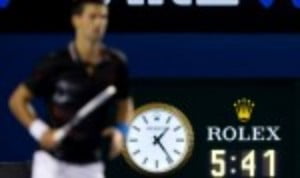
Top tips to improve your game
Originally published on 02/01/18 00:00
Few sports examine willpower and the solidity of a person’s self-belief as much as tennis.
It is hard to find parallels to the lonely and gladiatorial place of a tennis court during a tough match.
The 2012 Australian Open final between Novak Djokovic and Rafael Nadal highlighted the complex skills needed to play at the highest level. It was a six-hour test of brutal physical endurance; mental focus and emotional control that delivered accomplished tennis strokes even at the end when fatigue was almost absolute.
However, these skills were learned over a long period of time, and although they seem impossible at the start of the journey, in time these abilities become reachable. Understanding my coaching philosophy will help you compete more effectively by inspiring you to learn and trust in the process that will mold you into a mentally tough athlete.
Inspiration: Paint the dream.
Excite players by planting the seed that what they want is attainable, and then promptly ask them to forget about it and focus on the immediate achievable goal in front of them. A shift in the excitement needs to happen, an eagerness that fuels the imagination about the possibilities that small improvements can achieve. At any level during a crisis of confidence or poor run of form, it is imperative that you find a simple achievable change that will turn things around. The athlete must believe that when this small change clicks into place results will improve. No matter how competent and knowledgeable coaches are, they are poor coaches if they cannot inspire athletes.
Work hard and good things will happen, you just don’t know when.
Work to become a better player. Fall in love with the process of small incremental improvements. Searching for the one big thing that will make a significant difference is a red herring. Process over outcome! It is human nature to expect good results after a period of good and hard work. Tennis will test your resolve. It is rare to get results when we think we are ready, because we generally think we are further down the line than we are, so the message and mentality must remain relaxed with the belief that if we work hard then “good things will happen, we just never know when!”
Success is based on your weapons not your weaknesses. Spend more time building your weapons than improving weaknesses.
Confidence comes from trusting your weapons and over time the belief is so strong that even if you miss four in a row you will still not hesitate on the fifth. The contrast between your strengths and weaknesses is often powerful and a weapon. An unpredictable weakness is very difficult mentally for opponents if they cannot take it for granted that finding it will always bear fruit. The trick is to embrace your weaknesses as part of your game and endeavour to become increasingly effective warts and all.
Keep it simple. Love the process and never work on more than two things at once.
Less done well is more. Mastering two small improvements that bed in for life is faster than superficially improving six things that are forgotten over time. Your focus and mind is more effective when the road is simple and clear, which in my experience means two key points to improve is as much as we can handle effectively.
There is no competitive advantage unless you create it.
Top players create an aura that wins matches before they walk on the court. The locker room is anywhere in the public domain. How you practice, train, dress, talk, your posture, communicate on social media, in fact the total image you portray and ultimately your results, determine your Locker Room Power. Anyone can develop this edge called Locker Room Power. Your attitude allied to a consistent message that says you are on a mission to improve will help you bring an increasingly higher level to the court which other players will notice. Your desire becomes evident and, with the will to work hard, your weapons start to emerge and your belief as a competitor begins to shine through. The process of building Locker Room Power begins through understanding what constitutes a competitive mentality – the mission to improve.
About the author
Dave Sammel has more than 25 years' experience coaching pros to career-high rankings, many of whom have represented their countries in Davis Cup and at the Olympics. Dave became an official ATP coach in 2014 and released a best-selling psychology and coaching book, "Locker Room Power: Building an athlete's mind"
http://www.lockerroompower.com


